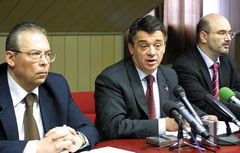- Serbia
Get to know Serbia
- Citizens
Culture and science
Health services
Pension and disability insurance
- Business
Employment
Economy
- Media
- Government
- Contact
Keep in touch
Contact form
Back
Keepin touch
Whether you have a question, comment, suggestion or any problem in the purview of the government, send us your message and we will try to respond as soon as possible. If your problem is not in our purview, we will forward your message to the relevant institution.
Q:
A:
Fully respected procedure during suspected bird flu presence
Belgrade,
29 March 2006
Serbian Minister of Health Tomica Milosavljevic said today that in cases of repeated suspected infection of people with the bird flu virus in Serbia, hospitalisation and isolation procedures will be consistently implemented.
Speaking at a press conference at the occasion of the latest information from the session of the World Health Organisation's (WHO) Standing Committee for Europe on the avian influenza and the working group's report on its past and future activities, Milosavljevic said that the relevant people and institutions in Bajina Basta professionally and fully followed the procedure envisaged in the Law on protection of population from contagious diseases, which included admission of the four ill children to hospital in Uzice.
The minister said that if a person from an infected area feels symptoms that point to the presence of the dangerous disease, that person must be isolated and hospitalised in order to be preventively treated with "oseltamivir."
Milosavljevic said that reports by the British Weybridge Laboratory stating that the dead swan and cock found in Bajina Basta were infected with H5N1 virus justified the use of precautionary measures. Otherwise, the responsibility and seriousness of the Serbian health care system would have been put into question.
Director of the Veterinary Administration at the Ministry of Agriculture, Forestry and Water Management Dejan Knjajic stated that the spread of bird flu among domestic poultry and wild birds in Serbia was prevented thanks to the timely reaction of vets. He pointed out that both the EU and international organisations praised Serbia for the quick reaction.
The minister, who participated at the Copenhagen session of the WHO Standing Committee for Europe, announced that the next annual session of this organisation will be held in September 2007 in Belgrade. He added that it will be the first time in the 60-year long history of the WHO that this important event takes place in Serbia.
The minister said that if a person from an infected area feels symptoms that point to the presence of the dangerous disease, that person must be isolated and hospitalised in order to be preventively treated with "oseltamivir."
Milosavljevic said that reports by the British Weybridge Laboratory stating that the dead swan and cock found in Bajina Basta were infected with H5N1 virus justified the use of precautionary measures. Otherwise, the responsibility and seriousness of the Serbian health care system would have been put into question.
Director of the Veterinary Administration at the Ministry of Agriculture, Forestry and Water Management Dejan Knjajic stated that the spread of bird flu among domestic poultry and wild birds in Serbia was prevented thanks to the timely reaction of vets. He pointed out that both the EU and international organisations praised Serbia for the quick reaction.
The minister, who participated at the Copenhagen session of the WHO Standing Committee for Europe, announced that the next annual session of this organisation will be held in September 2007 in Belgrade. He added that it will be the first time in the 60-year long history of the WHO that this important event takes place in Serbia.
-
 Belgrade, 26 November 2025
Belgrade, 26 November 2025Serbia-Hungary partnership best example of European cooperation
-
 Belgrade, 22 January 2025
Belgrade, 22 January 2025Egypt one of Serbia’s closest partners on international stage
-
 Belgrade, 9 July 2024
Belgrade, 9 July 2024Support for 104 associations in diaspora that preserve Serbian language, culture
-
 Belgrade, 15 April 2024
Belgrade, 15 April 2024Competition for StarTech grants open until 31 May
-
 Belgrade, 2 October 2023
Belgrade, 2 October 2023Serbia respects Resolution 1244 and will do everything to preserve peace
-
 Belgrade, 13 September 2023
Belgrade, 13 September 2023Day of Serbian Unity to be celebrated outside borders of Serbia, Republika Srpska for the first time
-
 Belgrade, 8 August 2023
Belgrade, 8 August 2023RSD 24.2m in state aid paid out to citizens affected by storm
-
 Belgrade, 17 June 2023
Belgrade, 17 June 2023Belgrade is doing everything to preserve peace in Kosovo and Metohija
-
 Belgrade, 15 June 2023
Belgrade, 15 June 2023Slovenia will continue to support Serbia on its way to EU
-
 Belgrade, 5 May 2023
Belgrade, 5 May 2023Emergency measures, tightening of conditions for possessing weapons

